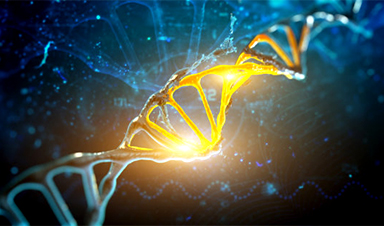Researchers have devised a magnetic control system to make tiny DNA-based robots move on demand — and much faster than recently possible.
In the journal Nature Communications, Carlos Castro and Ratnasingham Sooryakumar and their colleagues from The Ohio State University report that the control system reduced the response time of prototype nano-robot components from several minutes to less than a second.
Not only does the discovery represent a significant improvement in speed, this work and one other recent study herald the first direct, real-time control of DNA-based molecular machines.
The discovery could one day enable nano-robots to manufacture objects — such as drug-delivery devices — as quickly and reliably as their full-size counterparts. Previously, researchers could only move DNA indirectly, by inducing chemical reactions to coax it to move certain ways, or introducing molecules that reconfigure the DNA by binding with it. Those processes take time.
“Imagine telling a robot in a factory to do something and having to wait five minutes for it to perform a single step of a task. That was the case with earlier methods for controlling DNA nano-machines,” said Castro, associate professor of mechanical and aerospace engineering.
“Real-time manipulation methods like our magnetic approach enable the possibility for scientists to interact with DNA nano-devices, and in turn interact with molecules and molecular systems that could be coupled to those nano-devices in real-time with direct visual feedback.”
Image Credit: Fotolia
News This Week
Repurposed drugs could calm the immune system’s response to nanomedicine
An international study led by researchers at the University of Colorado Anschutz Medical Campus has identified a promising strategy to enhance the safety of nanomedicines, advanced therapies often used in cancer and vaccine treatments, [...]
Nano-Enhanced Hydrogel Strategies for Cartilage Repair
A recent article in Engineering describes the development of a protein-based nanocomposite hydrogel designed to deliver two therapeutic agents—dexamethasone (Dex) and kartogenin (KGN)—to support cartilage repair. The hydrogel is engineered to modulate immune responses and promote [...]
New Cancer Drug Blocks Tumors Without Debilitating Side Effects
A new drug targets RAS-PI3Kα pathways without harmful side effects. It was developed using high-performance computing and AI. A new cancer drug candidate, developed through a collaboration between Lawrence Livermore National Laboratory (LLNL), BridgeBio Oncology [...]
Scientists Are Pretty Close to Replicating the First Thing That Ever Lived
For 400 million years, a leading hypothesis claims, Earth was an “RNA World,” meaning that life must’ve first replicated from RNA before the arrival of proteins and DNA. Unfortunately, scientists have failed to find [...]
Why ‘Peniaphobia’ Is Exploding Among Young People (And Why We Should Be Concerned)
An insidious illness is taking hold among a growing proportion of young people. Little known to the general public, peniaphobia—the fear of becoming poor—is gaining ground among teens and young adults. Discover the causes [...]
Team finds flawed data in recent study relevant to coronavirus antiviral development
The COVID pandemic illustrated how urgently we need antiviral medications capable of treating coronavirus infections. To aid this effort, researchers quickly homed in on part of SARS-CoV-2's molecular structure known as the NiRAN domain—an [...]
Drug-Coated Neural Implants Reduce Immune Rejection
Summary: A new study shows that coating neural prosthetic implants with the anti-inflammatory drug dexamethasone helps reduce the body’s immune response and scar tissue formation. This strategy enhances the long-term performance and stability of electrodes [...]
Scientists discover cancer-fighting bacteria that ‘soak up’ forever chemicals in the body
A family of healthy bacteria may help 'soak up' toxic forever chemicals in the body, warding off their cancerous effects. Forever chemicals, also known as PFAS (per- and polyfluoroalkyl substances), are toxic chemicals that [...]














Leave A Comment